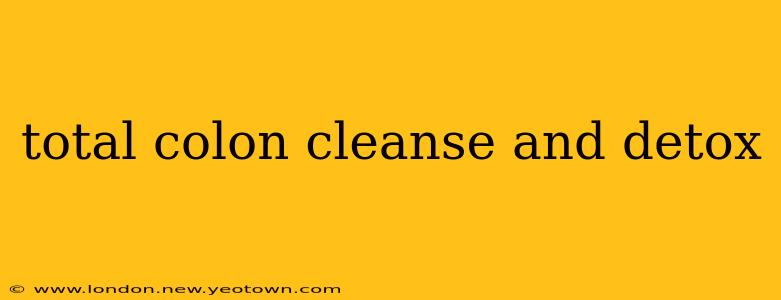The human gut—a complex ecosystem teeming with trillions of bacteria, fungi, and other microorganisms—plays a vital role in overall health. From digestion and nutrient absorption to immunity and even mood regulation, a healthy gut is essential. But what happens when this delicate balance is disrupted? Many turn to a "total colon cleanse and detox" hoping to reset their digestive system and improve their well-being. But what does that actually entail, and is it right for you?
This isn't a simple yes or no answer. The idea of a "total colon cleanse" evokes images of harsh, potentially damaging procedures. However, a holistic approach to gut health, focusing on cleansing and detoxification, is a different story entirely. Let's explore the nuances.
What is a Colon Cleanse?
The term "colon cleanse" often conjures up images of intense and sometimes risky procedures. However, a gentler, more holistic approach focuses on supporting the body's natural detoxification processes. This doesn't involve aggressive interventions but rather a series of lifestyle changes designed to promote healthy bowel movements and eliminate waste effectively.
It's crucial to differentiate between medically supervised procedures (like colonoscopies) and the many over-the-counter products marketed as colon cleanses. The latter often contain harsh laxatives that can disrupt your gut's delicate balance and cause dehydration, cramping, and other adverse effects. A medically supervised colon cleanse is typically recommended for specific medical reasons, and it is not the same as the home-based cleanses often promoted online.
What is a Detox?
The concept of "detox" is similarly broad. Our bodies are naturally equipped with organs like the liver and kidneys, which continuously filter toxins and waste products. While the idea of a "total body detox" might seem appealing, it's crucial to understand that our bodies are constantly detoxifying themselves. Claims that certain products or practices can dramatically accelerate this process should be viewed with skepticism.
However, supporting the liver and kidneys' function through a healthy lifestyle is beneficial. This includes a balanced diet rich in fruits, vegetables, and fiber, adequate hydration, and regular exercise. These practices help your body function optimally, promoting natural detoxification processes.
Are Colon Cleanses and Detox Diets Necessary?
This is a frequently asked question, and the answer is usually no. For most people, a healthy diet rich in fiber, plenty of water, and regular exercise are sufficient to maintain a healthy digestive system. Your body has its own natural detoxification mechanisms that work efficiently without the need for drastic interventions.
What are the Benefits of a Healthy Gut?
A healthy gut is intrinsically linked to overall well-being. The benefits are numerous, impacting various aspects of your health:
- Improved Digestion: A balanced gut microbiome aids in efficient digestion and nutrient absorption.
- Enhanced Immunity: A significant portion of your immune system resides in your gut.
- Better Mental Health: The gut-brain axis highlights the strong connection between gut health and mental well-being.
- Weight Management: Gut bacteria influence metabolism and appetite regulation.
What are Some Natural Ways to Support Gut Health?
Instead of resorting to harsh cleanses, focus on these gentle, effective methods:
- High-Fiber Diet: Include plenty of fruits, vegetables, and whole grains.
- Hydration: Drink plenty of water throughout the day.
- Probiotic-Rich Foods: Yogurt, kefir, and sauerkraut can introduce beneficial bacteria.
- Prebiotic Foods: Onions, garlic, and bananas nourish existing gut bacteria.
- Regular Exercise: Physical activity promotes gut motility.
- Stress Management: Chronic stress negatively impacts gut health.
Do Colon Cleanses Help with Weight Loss?
While some people report weight loss after a colon cleanse, this is likely due to temporary fluid loss, not actual fat reduction. Sustainable weight loss is achieved through a balanced diet and regular exercise, not through drastic cleanses.
Can Colon Cleanses Help with Bloating and Constipation?
While some might experience temporary relief from bloating and constipation after a colon cleanse, these are often symptoms of underlying issues that need to be addressed through lifestyle changes rather than a quick fix. A high-fiber diet, adequate hydration, and regular exercise are far more effective long-term solutions.
In conclusion, while the idea of a "total colon cleanse and detox" is alluring, a gentler, more holistic approach focusing on supporting your body's natural processes is far more effective and sustainable. Prioritize a healthy diet, regular exercise, and stress management to nurture a healthy gut and overall well-being. Always consult with your doctor before starting any new diet or health regimen.

